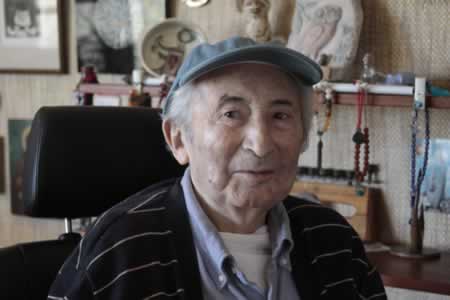
Anatol Chari relocated to Laguna Beach from Los Angeles in 1968 for the usual reasons; better prospects for a private practice and a better environment to raise his children.
Even so, the periodontist, who trained at the University of Iowa’s dental school and served as a U.S. Air Force dental officer, arrived with some unusual baggage. He possessed a collection of World War II stories about surviving life in the Lodz ghetto and German concentration camps.
With the help of a neighbor, Chari finally fully unpacked his harrowing survivor’s tale, adding another chapter to Holocaust scholarship with the publication of “From Ghetto to Death Camp: A Memoir of Privilege and Luck.” The original work was published in Germany in 2010.
“Night,” perhaps the best-known work in the genre, recounts the experience of former Auschwitz prisoner Elie Wiesel. As part of a week-long residency at Chapman University’s Holocaust Education Center, Wiesel will close the campus Holocaust Remembrance Day, Thursday, April 19. The program in Memorial Hall is to begin at 7 p.m.
“I think the stories he tells suggest he has pondered for years the reasons he survived and others didn’t,” neighbor Timothy Braatz, a Saddleback College history professor and the book’s co-author, says in the forward of “Ghetto to Death Camp.” Invited to sample from his neighbor’s wine collection after moving next door in 2001, Braatz discovered an even more intriguing collection as Chari recounted his past.
Though seven decades have elapsed, Chari still chokes with emotion and his eyes shine with tears as he describes with precision the arrest on Nov. 10, 1939, of his father, Piotr, a highly regarded politician who served on business councils within the Jewish community of Lodz, Poland. His father was on a hit list of prominent people detained shortly after the German invasion and was swiftly executed.
At the time, Chari was 16. Today, the still adoring and grateful son acknowledges his father’s position of privilege secured him an easy job among the Sonderkommando, ghetto policeman, as well as a diet supplemented with extras. Both enabled him to survive the extreme privations of Auschwitz and Bergen-Belsen that followed. “Over there, my father’s influence ended,” he deadpanned.
Years later, Chari found a record of his father, prisoner No. 129, at a Holocaust memorial opened in 2005 at the former Radegast station where the last transport departed from the Lodz Ghetto in 1944. “I was treated like a VIP,” he said. His step-mother’s work certificate is in a Holcaust museum at the former Birkenau death camp.
Chari’s “time-tempered confessions of a privileged Sonder reveal a society where the accident of birth, access to education and vagaries of chance meant the difference between a short miserable existence and a more desirable life—a microcosm of our global society,” writes Braatz in their book’s forward.
Another friend, Steve Chew, described the book as “filled with wonder and humor on a topic that normally is only dreadful and saddening.”
Chari’s account of a Jewish ghetto policeman is rare within the body of Holocaust literature, according to Braatz, who specializes in peace studies rather than Holocaust scholarship. “So far as I know, there are just a few brief writings by ghetto policeman available. No full-length accounts like this. I don’t think this book changes any understanding, but it may provide some new insights into Jewish ghetto life.”
Their book, very much like Chari in person, recounts horrible episodes with a certain detachment that lacks any religious or philosophical overtones. Now 88, Chari can even joke about his experiences, such as his own lack of elation at the liberation of Bergen-Belsen in 1945. “We sat there. We were so undernourished that the lice were anemic.”
“Humans are remarkably resilient,” said Braatz.
Their book is available on Amazon.




